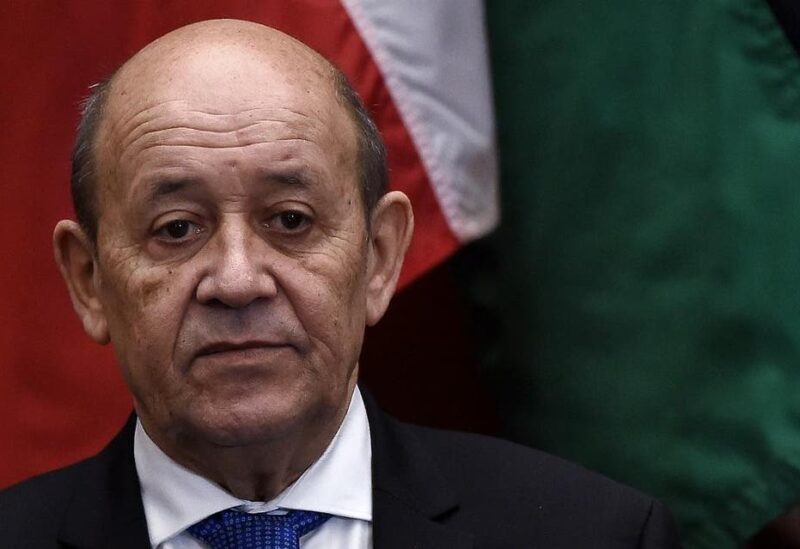
A file photo shows French Foreign Affairs Minister Jean-Yves Le Drian. (AFP)
After his message to parliament, will Le Drian’s visit bring new developments?
It is expected that the picture of the upcoming phase and the future of the French-supported initiative by the concerned countries in the Lebanese dossier will become clearer during the next week, specifically before the end of the current month. This is the deadline set by the French envoy Jean-Yves Le Drian to receive answers regarding the two questions he posed to parliamentary blocs and a number of deputies. These questions relate to the specifications of the new president of the republic and his action plan. This is ahead of determining the date of his upcoming visit to Beirut next month and the potential outcomes of this visit concerning the Lebanese dossier.
What is noteworthy is that the “Development and Liberation” bloc, headed by President Nabih Berri, was the first to submit its response at the French Embassy’s headquarters in Beirut regarding the two questions posed by the French official.
Regarding this matter, a parliamentary source within the bloc affirms to “Sawt Beirut International” that the bloc’s response is clear concerning the posed questions. This is because President Berri’s stance on the dialogue issue is explicit and not new. He had announced it nearly a year ago during the commemoration of the disappearance of Imam Musa al-Sadr on August 31 of last year. In that speech, he also touched upon the specifications of the President of the Republic, his support for any dialogue and meeting aimed at finding a way out of the crisis. The source also points out that the bloc’s position stems from a comprehensive national logic, urging the opposition to engage in dialogue and discussion in an attempt to reach common ground that would extricate the country from the vortex of stagnation.
Regarding the possibility of the “Shiite Duo” relinquishing their candidate Suleiman Franjieh, the source considers that it is their right to nominate and support their candidate, especially as they find in him a national figure with solid domestic, regional, and international relations. He is also capable of addressing fundamental issues such as defense strategy, Syrian refugees, and other topics. Furthermore, he possesses the ability to engage in dialogue, discussion, and initiatives to resolve various crises. However, the source affirms that the door to dialogue is open with all parties to reconsider the name and specifications of the future president.
On their part, moderate parliamentary sources express pessimism about the future of the upcoming presidential election, especially in light of the statement made by the head of the “Loyalty to the Resistance Bloc,” Deputy Mohammad Raad, to the French envoy. Raad affirmed the party’s unwavering commitment to nominating the head of the “Marada Movement,” Suleiman Franjieh, no matter what. This indicates that there is no possibility of reaching a consensus on the president’s name. The sources pointed out that all indications suggest that the “Shiite Duo,” particularly “Hezbollah,” does not desire to elect a president for the republic according to the norms and constitution. This implies that the atmosphere does not suggest the possibility of convergence in viewpoints between the opposition and the party. The divide between them is widening. Consequently, these sources are skeptical about the results of the upcoming visit by the French envoy to Beirut next month.
Conversely, oppositional parliamentary sources told “Sawt Beirut International” that the election of a president for the republic should occur through the parliament, as clearly stipulated by the Lebanese constitution, rather than through dialogue. These sources express regret that there is a political faction that continues to hold the parliament hostage by obstructing the election of a president, while also threatening to establish a statelet in place of the nation. This faction aims to position itself as the genuine alternative while rejecting the application of laws.
They argue that the continuation of the presidential vacuum is better than having a president who would be a puppet in the hands of “Hezbollah,” implementing the party’s agenda through the constitution and safeguarding the resistance’s interests. They highlight the fact that Lebanon has a single Lebanese army tasked with protecting all citizens to prevent a situation where there are different realities under one roof. These sources emphasize that the ascent of such a president would only further exacerbate the crisis on all levels.
The sources emphasized that if a dialogue is to be pursued, it must prioritize essential issues that concern the entire Lebanese people. This is particularly relevant when it comes to the matter of arms. The Taif Agreement was clear in stating that there should be no weapons except under the authority of the legitimate Lebanese state, not under the control of the Iranian-affiliated Islamic resistance. Thus, the party’s arms are beyond the bounds of legitimacy, and they exert control over the people, the constitution, the judiciary, and the security forces.
The oppositional sources conclude by considering that the French envoy, through the questions he posed, may have deviated from diplomatic norms. However, they also reveal that they are preparing a unified stance for dealing with the upcoming visit of Le Drian.